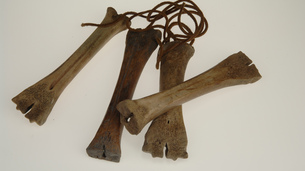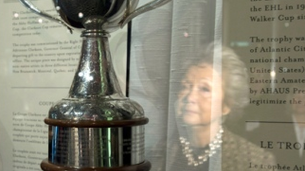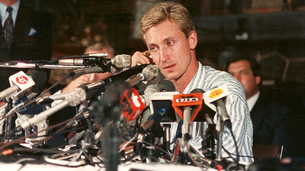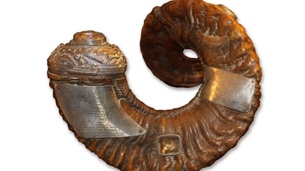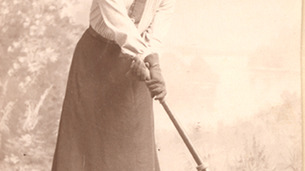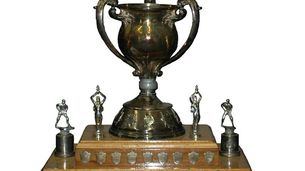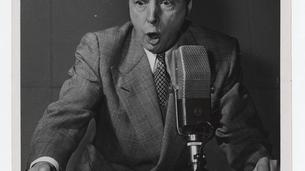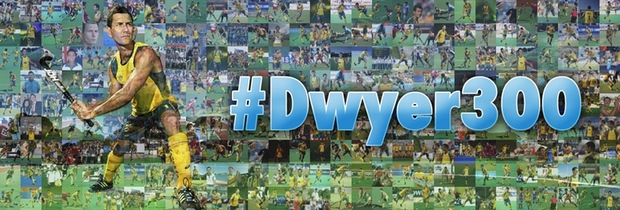
Jamie Dwyer could have been revered around the globe as another Cristiano Ronaldo or Lionel Messi had he chosen soccer over hockey.
But hockey chose him, writes Gené Stephan.
“Hockey is a family sport that people play because they love it and not because of the fame or fortune,” the Olympic and World Cup gold medalist said.
The 34-year-old Queenslander has five times been honoured as the best player in the world, ranking him not only as one of the best players of his generation, but also one of the greatest to have ever played the game.
As he prepared for his 300th game at the new FIH Hockey World League in Rotterdam on Wednesday June 19, 2013, his focus will be no different to what it was 12 years ago when he first forced his way into a star-studded Australian team as a 22-year-old.
He has always been relentless in his quest to become a better player, and in doing so, contribute to the Kookaburras’ international success.
/Kookaburras%20M.bmp) Tutelage from Olympic gold medal-winning coaches Ric Charlesworth and Barry Dancer, coupled with extended playing stints in Europe and India, has enabled him to evolve from an impact striker to a midfield playmaker capable of dictating and controlling a game.
Tutelage from Olympic gold medal-winning coaches Ric Charlesworth and Barry Dancer, coupled with extended playing stints in Europe and India, has enabled him to evolve from an impact striker to a midfield playmaker capable of dictating and controlling a game.
As lethal as Dwyer has been at scoring goals, it has been his individuality and elusiveness in general play, that has set him apart from the rest.
“Every generation has some very special players and the only other one I would rank alongside him is Teun de Nooijer of Holland and possibly Christopher Zeller from Germany,” Charlesworth said.
“Jamie has a mercurial capacity to do something special and unusual and he does it far too often for it to be a fluke.
“The mark of a really great player is to endure and continue to be competitive – and to have that competitive instinct in the game - you can tick every box for him.”
However, it was under Dancer, the man who ended Australia’s 48-year Olympic hoodoo with gold in men’s hockey (Charlesworth won two with the women) in Athens in 2004, that Dwyer won the first of five FIH World Player of the Year awards.
“You have to rate Jamie as world hockey has – he is an outstanding athlete, superb technically, has a competitive mentality and a strong team ethic – all the qualities you search for in a player,” Dancer said.
/Jamie%20Dwyer%20recordv2.bmp) Dancer, who retired as national coach after backing up with Olympic bronze in Beijing in 2008, said Dwyer has continued to develop as a player after stints in the Netherlands and Spain and this year in the new Hockey India League where he played under him with the Punjab Warriors.
Dancer, who retired as national coach after backing up with Olympic bronze in Beijing in 2008, said Dwyer has continued to develop as a player after stints in the Netherlands and Spain and this year in the new Hockey India League where he played under him with the Punjab Warriors.
“Jamie has shown it is possible to become a full-time hockey player and has mentored other Australian players who have looked at doing the same,” Dancer added.
“It is extremely valuable to build a team when you have a strong leader like Jamie - I was blessed to have a number of those players in the team that won gold in Athens.”
Unlike De Nooijer, a close friend and Bloemendaal team-mate in the Dutch National League, Dwyer is not yet thinking of retirement.
“I just want to keep on winning medals and keep on getting better - there’s so much more that I, and the team, can achieve,” Dwyer said.
“Setting aside my Olympic and World Cup gold medals – my proudest achievements has been that I have made the most of my potential and tried to get the best out of my body.”
He said a lot of retired players admit they probably never trained hard enough or paid enough attention to developing their skills.
/Top%20Scorers.bmp) “The one thing I can do is look in the mirror and say I’ve really given it everything to become the best player possible,” Dwyer said.
“The one thing I can do is look in the mirror and say I’ve really given it everything to become the best player possible,” Dwyer said.
“At the end of the day when I finish with the game, whenever that may be, I can feel proud of that.”
He said the day his body prevents him from playing at the level he’d like to will be when he calls it quits – and at the moment, his body is as good as it has ever been.
This week in the Netherlands is very important for Dwyer and the Kookaburras in their quest to qualify for next year’s World Cup where they will defend the title won under Charlesworth in New Delhi in 2010.
The top three teams in the eight-nation semifinal gain automatic World Cup qualification for The Hague.
Since scoring the golden goal which won Australia’s only men's Olympic gold in 2004, Dwyer has become the nation’s most successful striker with 186 goals – surpassing former greats Mark Hager (179), Jay Stacy (160) and Stephen Davies (140). Among the current crop of Australian players Glenn Turner (65), Des Abbott (61) and Chris Ciriello (59) are his nearest rivals.
Original Article by Lawrence West for Hockey Australia News http://www.hockey.org.au/

